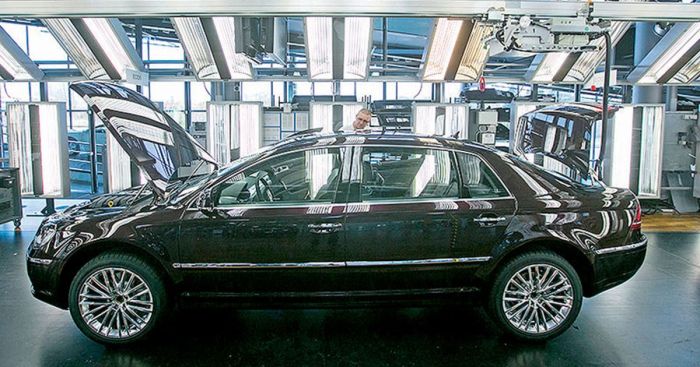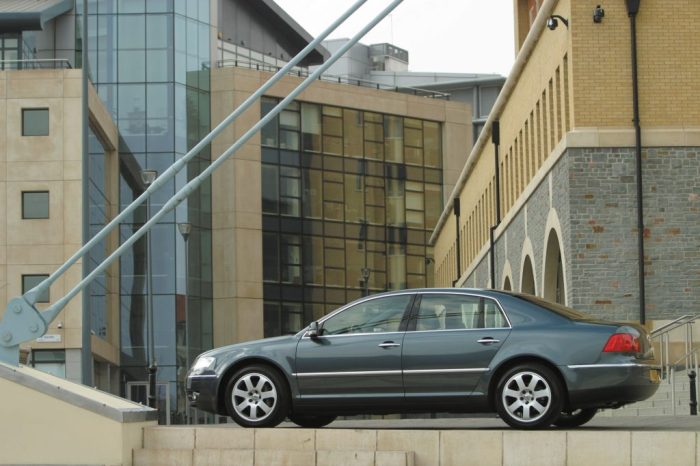Why volkswagen phaeton failed – Why did the Volkswagen Phaeton fail? This question has puzzled automotive enthusiasts and industry experts alike since the car’s discontinuation in 2016. With its luxurious features, advanced engineering, and prestigious Volkswagen badge, the Phaeton seemed destined for success. However, despite critical acclaim, the Phaeton never gained widespread acceptance, and its sales figures were consistently disappointing.
In this article, we will delve into the reasons behind the Phaeton’s failure, exploring its sales and marketing strategies, product development, pricing, brand perception, and competitive landscape.
Sales and Marketing Strategies

The Volkswagen Phaeton was positioned as a luxury sedan, intended to compete with established players like the Mercedes-Benz S-Class and the BMW 7 Series. Volkswagen targeted affluent buyers who sought a prestigious and comfortable driving experience.
The Phaeton was a flop for Volkswagen, despite its advanced features. The car’s high price tag and lack of brand recognition in the luxury segment contributed to its failure. Despite this setback, Volkswagen is still a major player in the automotive industry.
In fact, the company is planning to launch a new model in India soon. You can learn more about the upcoming launch by clicking here . However, the Phaeton’s failure serves as a reminder that even the most well-made cars can struggle to find success in the competitive automotive market.
The marketing campaigns for the Phaeton emphasized its advanced technology, refined craftsmanship, and luxurious amenities. However, critics argued that the marketing efforts failed to effectively differentiate the Phaeton from its competitors and establish a clear brand identity.
Despite its high price tag, the Volkswagen Phaeton failed to gain traction in the market due to its lack of brand recognition and appeal. However, Volkswagen’s acquisition of Porsche in 2012 gave the company access to Porsche’s engineering expertise and brand cachet, which could have potentially helped the Phaeton succeed.
Despite this, the Phaeton’s failure remains a cautionary tale about the challenges of entering the luxury car market.
- The Phaeton’s sales fell short of expectations, with only around 84,000 units sold worldwide over its production lifespan.
- In its key markets, the Phaeton struggled to gain significant market share, facing stiff competition from established luxury brands.
- Despite Volkswagen’s efforts to position the Phaeton as a premium product, its sales volume and market share remained relatively low.
Competition and Market Dynamics: Why Volkswagen Phaeton Failed
The Volkswagen Phaeton faced intense competition in the luxury sedan market, which was dominated by established players like Mercedes-Benz, BMW, and Audi.
These competitors had a strong brand reputation, loyal customer base, and well-established distribution networks. They also offered a wide range of models with varying features and price points, catering to a diverse range of customer needs.
Key Competitors, Why volkswagen phaeton failed
- Mercedes-Benz S-Class
- BMW 7 Series
- Audi A8
- Lexus LS
- Jaguar XJ
Competitive Landscape and Market Trends
The luxury sedan market was characterized by high levels of competition and innovation. Competitors were constantly introducing new models and technologies to attract customers.
The market was also becoming increasingly globalized, with manufacturers from around the world competing for market share. This increased competition made it difficult for the Phaeton to gain a significant foothold in the market.
Impact of Competitors’ Strategies
The strategies of the Phaeton’s competitors had a significant impact on its performance. Mercedes-Benz, BMW, and Audi focused on building strong brand images and offering a wide range of models to cater to different customer needs.
They also invested heavily in marketing and advertising to promote their vehicles and build brand awareness. This made it difficult for the Phaeton to compete, as it lacked the same level of brand recognition and marketing support.
Last Word

The Phaeton’s failure is a cautionary tale for automakers who underestimate the importance of market research, brand positioning, and value proposition. By failing to properly understand its target market and communicate the Phaeton’s unique value, Volkswagen doomed the car to failure.
However, the Phaeton’s legacy lives on as a testament to the challenges of competing in the ultra-competitive luxury car market.
The Volkswagen Phaeton failed due to its high price and lack of brand recognition. Volkswagen attempted to position the Phaeton as a luxury sedan, but it lacked the prestige of established brands like Mercedes-Benz and BMW. Despite its advanced engineering, the Phaeton struggled to gain traction in the market.
Volkswagen also made a bold move by acquiring Bugatti in 1998. Did Volkswagen make Bugatti ? Yes, they did. However, this acquisition did little to boost the Phaeton’s sales, as the two brands targeted different market segments.
The Volkswagen Phaeton was a luxury sedan that failed to meet sales expectations due to its high price and lack of brand recognition. However, it’s worth noting that not all Volkswagens have the same issues. For instance, some people wonder if Volkswagens burn oil.
The answer to that question can be found by clicking here . Despite the Phaeton’s failure, Volkswagen continues to produce reliable and fuel-efficient vehicles.
The Phaeton, Volkswagen’s attempt at a luxury sedan, failed due to its high price, lack of brand recognition, and competition from established rivals. Despite Volkswagen’s efforts to market the Phaeton as a premium vehicle, it failed to gain traction in the market.
To address this, Volkswagen implemented an “ad hoc” strategy, focusing on specific target groups and customizing marketing campaigns to their needs. Read more about Volkswagen’s ad hoc strategy and how it impacted the Phaeton’s sales.